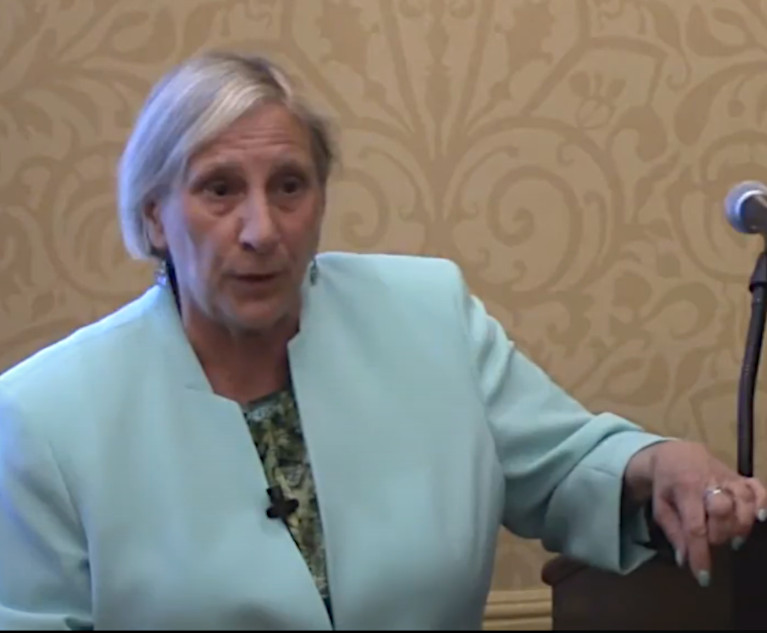NY Employers Grapple With New Sexual Harassment Law, in Effect Today
While New York state's sweeping Sexual Harassment Prevention Policy becomes effective today, employers have until Oct. 9, 2019, to implement the arguably most onerous requirement of the new law.
October 09, 2018 at 01:55 PM
5 minute read
The original version of this story was published on Corporate Counsel
 Sexual harassment/Credit: andriano.cz/Shutterstock.com
Sexual harassment/Credit: andriano.cz/Shutterstock.com
Today marks a big deadline for employers in New York, although not quite as big as some initially feared.
Under New York state's new sweeping Sexual Harassment Prevention Policy, all employers must have adopted and distributed, either via paper or electronic means, a sexual harassment prevention policy by today, the effective date of the law. However, employers have another full year, until Oct. 9, 2019, to implement arguably the most onerous requirement of the new law: sexual harassment training for all employees who work a portion of their time in New York. (An earlier version required the training to occur by year's end.)
“The requirement to actually have a policy and distribute it is new, and a lot of employers really did not have this robust policy that is now required,” said Tammy Riddle, a member in the business law and employment practices groups at Hurwitz & Fine.
In addition to mandating the implementation of a sexual harassment policy and training, the law also requires that employers establish training for new hires “as soon as possible” from their start date and perform the training on an annual basis. (New York City also recently adopted its own regulation, requiring all employers, as of last month, to display in a conspicuous place anti-sexual harassment posters and provide the corresponding information to employees.)
Employers don't have to start from scratch, however. The state provides model policies and training programs, but Riddle said companies should be careful with those given that the model training guides, for example, include requirements that are not contained in the law.
“Every client is in a different industry, and the model training and policy guides may not be a one-size-fits-all solution,” she said. “Employers should take a look at their own policies and modify those to fit their mission and their administration.”
But it's not just the models that require more. The law itself mandates items that aren't typically included in employers' training modules, said Allan Bloom, an employment and labor law partner at Proskauer Rose. These include, he added, information about the federal and state statutes governing sexual harassment, the remedies available to victims of sexual harassment, the available forums for adjudicating sexual harassment complaints, both administratively and judicially, a procedure for the timely and confidential investigation of complaints and a complaint form.
“Most employers are not necessarily looking to educate their employees on what the law is and what their remedies are,” Bloom said.
To Robert Brody, founder and managing member of Brody and Associates, a management-side labor, employment and benefits firm, the new law is just another onerous burden for employers.
These new regulations “are not going to break the bank, but it's just one more reason that it's a pain in the neck to do business in New York state sometimes,” he said.
Brody said that because the state's model policy and training program require more than the law itself, many employers, who would rather just adopt what is free rather than pay to have a tailor-made policy drafted, will be engaging in onerous, unnecessary tasks. In addition, training new employees “as soon as possible” could mean training as often as every month if employers opt to train new hires within 30 days of their start date, as an earlier version required, he added.
“All of a sudden you have to train people, everyone in your organization; that's a pretty big nut to crack,” Brody said. All the requirements are “just difficult, and I think we want to be smart about not creating such a difficult environment that we start saying, “Other states look a lot better than New York.'”
Riddle predicted that the requirement for sexual harassment prevention training to be “interactive” may present the largest challenge for employers. Although the state has made clear that a live trainer is not required, “it did state that if you're just playing a video or handing out a document that does not provide for questions to be answered or some sort of back-and-forth, that's not going to qualify as interactive,” she said.
Bloom said that many employers will likely start rolling out their training sometime this fall or late this year. But Riddle said some employers will apply the policy-distribution deadline to the training and begin doing so today.
“It's a relief that they've got additional time with the training, but employers shouldn't take a sit-back-and-breathe position with it because being proactive may be very helpful in preventing” alleged incidents of workplace sexual harassment, she said.
This content has been archived. It is available through our partners, LexisNexis® and Bloomberg Law.
To view this content, please continue to their sites.
Not a Lexis Subscriber?
Subscribe Now
Not a Bloomberg Law Subscriber?
Subscribe Now
NOT FOR REPRINT
© 2025 ALM Global, LLC, All Rights Reserved. Request academic re-use from www.copyright.com. All other uses, submit a request to [email protected]. For more information visit Asset & Logo Licensing.
You Might Like
View All
A Plan Is Brewing to Limit Big-Dollar Suits in Georgia—and Lawyers Have Mixed Feelings
10 minute read
HUD Charges Texas HOA With Housing Discrimination in Last Days of Biden Administration
5 minute read
Trending Stories
Who Got The Work
J. Brugh Lower of Gibbons has entered an appearance for industrial equipment supplier Devco Corporation in a pending trademark infringement lawsuit. The suit, accusing the defendant of selling knock-off Graco products, was filed Dec. 18 in New Jersey District Court by Rivkin Radler on behalf of Graco Inc. and Graco Minnesota. The case, assigned to U.S. District Judge Zahid N. Quraishi, is 3:24-cv-11294, Graco Inc. et al v. Devco Corporation.
Who Got The Work
Rebecca Maller-Stein and Kent A. Yalowitz of Arnold & Porter Kaye Scholer have entered their appearances for Hanaco Venture Capital and its executives, Lior Prosor and David Frankel, in a pending securities lawsuit. The action, filed on Dec. 24 in New York Southern District Court by Zell, Aron & Co. on behalf of Goldeneye Advisors, accuses the defendants of negligently and fraudulently managing the plaintiff's $1 million investment. The case, assigned to U.S. District Judge Vernon S. Broderick, is 1:24-cv-09918, Goldeneye Advisors, LLC v. Hanaco Venture Capital, Ltd. et al.
Who Got The Work
Attorneys from A&O Shearman has stepped in as defense counsel for Toronto-Dominion Bank and other defendants in a pending securities class action. The suit, filed Dec. 11 in New York Southern District Court by Bleichmar Fonti & Auld, accuses the defendants of concealing the bank's 'pervasive' deficiencies in regards to its compliance with the Bank Secrecy Act and the quality of its anti-money laundering controls. The case, assigned to U.S. District Judge Arun Subramanian, is 1:24-cv-09445, Gonzalez v. The Toronto-Dominion Bank et al.
Who Got The Work
Crown Castle International, a Pennsylvania company providing shared communications infrastructure, has turned to Luke D. Wolf of Gordon Rees Scully Mansukhani to fend off a pending breach-of-contract lawsuit. The court action, filed Nov. 25 in Michigan Eastern District Court by Hooper Hathaway PC on behalf of The Town Residences LLC, accuses Crown Castle of failing to transfer approximately $30,000 in utility payments from T-Mobile in breach of a roof-top lease and assignment agreement. The case, assigned to U.S. District Judge Susan K. Declercq, is 2:24-cv-13131, The Town Residences LLC v. T-Mobile US, Inc. et al.
Who Got The Work
Wilfred P. Coronato and Daniel M. Schwartz of McCarter & English have stepped in as defense counsel to Electrolux Home Products Inc. in a pending product liability lawsuit. The court action, filed Nov. 26 in New York Eastern District Court by Poulos Lopiccolo PC and Nagel Rice LLP on behalf of David Stern, alleges that the defendant's refrigerators’ drawers and shelving repeatedly break and fall apart within months after purchase. The case, assigned to U.S. District Judge Joan M. Azrack, is 2:24-cv-08204, Stern v. Electrolux Home Products, Inc.
Featured Firms
Law Offices of Gary Martin Hays & Associates, P.C.
(470) 294-1674
Law Offices of Mark E. Salomone
(857) 444-6468
Smith & Hassler
(713) 739-1250









